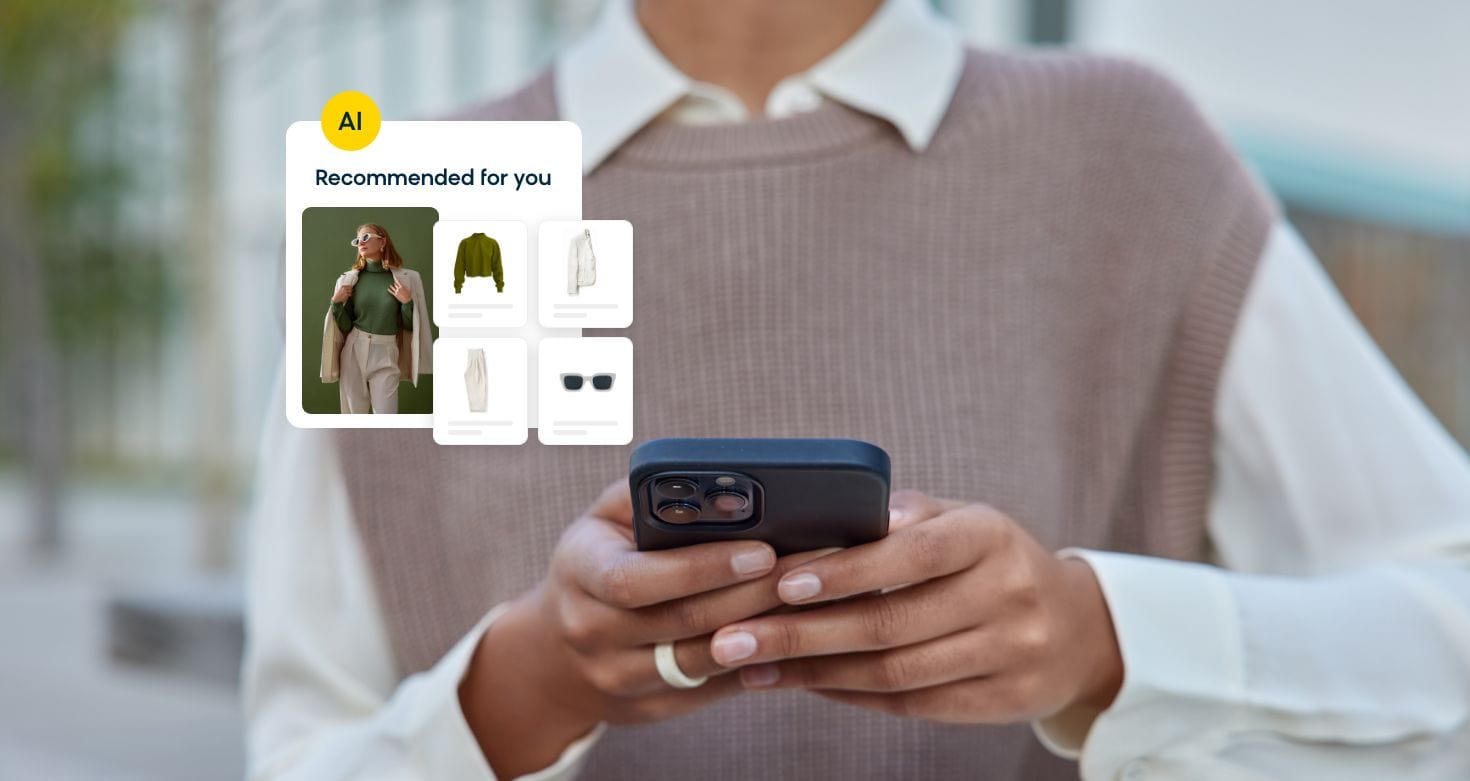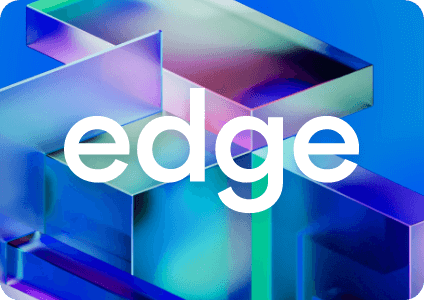Although AI has existed for some time, if you didn’t know better, you would think it just came out last week. That’s how popular the concept has been since it entered the public consciousness in 2022.
Artificial intelligence is more accessible than ever for shops of all sizes and budgets. 9 in 10 businesses actively invest in artificial intelligence, and conversational AI is projected to reduce contact center labor costs by $80 billion by 2026.
Aside from trimming operational costs, AI is a great fit for customer service. 36% of business professionals say that AI’s biggest benefit right now is its ability to offer 24/7 customer service. 77% of CRM leaders believe that AI will be responsible for resolving the majority of support tickets by 2025.
Since shopping AI is so customer-centric, it’s become essential for ecommerce success, as customers increasingly prefer to shop with AI.
In this blog, we’ll explore various elements of AI in shopping, discuss the four types of AI, and provide real-world examples of how AI in online shopping can increase sales and deepen customer engagement. Let’s dive in.
What Is AI in Shopping?
AI is rapidly transforming the shopping experience for both B2C and B2B customers. AI-powered shopping enhances the customer experience by making every transaction easier, more efficient, and deeply personalized. Essentially, AI can make online shopping as joyful as going to the best brick-and-mortar stores. This encourages online shoppers to return to your business and become loyal customers.
AI in shopping is often discussed in the context of retail, ecommerce, and fashion. These terms are often interchangeable and refer to the same type of technology that uses AI to improve the shopping experience.
AI-powered shopping is creating exciting opportunities for online retailers. B2C ecommerce brands can use AI to generate personalized shopping recommendations, offer virtual try-on capabilities, and automate order fulfillment. Meanwhile, B2B businesses can use AI for use cases like forecasting demand for a product and managing the supply chain.
What Are the Five Types of AI?
There are five types of AI commonly used in AI-powered ecommerce. Let’s get acquainted with them and their typical use cases:
1. Reactive AI
Reactive AI is a type of AI that reacts to specific inputs with preprogrammed actions. Reactive AI can quickly answer customer questions, provide product information, and help with basic troubleshooting. In online shopping, reactive AI is commonly used for chatbots, AI shopping assistants, and other automated customer service tools.
For instance, a customer shopping for a new bass guitar can rely on reactive AI (in the form of an AI assistant) to answer questions about the instrument, recommend accessories that enhance the playing experience, and manage basic customer service needs like order tracking or returns.
2. Limited Memory AI
Limited memory AI learns from past data and experiences. Also known as machine learning AI, limited memory AI is handy for personalizing and generally improving the customer journey. This type of AI can forecast customer behavior and use collected customer data to create an engaging AI-powered personalized experience that will likely result in conversions.
If you’re one of the millions of people who shop with Amazon, you’ve seen limited memory AI in action. The shopping platform is well-known for its array of product suggestions, which are all inspired by your previous purchases and browsing activity.
3. Theory of Mind AI
Theory of mind AI takes conversational commerce to a new level. This type of AI promises an experience akin to human communication. When AI can truly understand your shopper’s emotions, beliefs, and intentions, you can provide them with more sophisticated and intuitive interactions.
For example, let’s say you’re looking for new workwear and browse a selection of blazers, pants, and office-appropriate shoes. Theory of mind AI could examine this activity and assume that you intend to buy new work clothes, then suggest products that are stylish yet office-friendly.
Despite progress in language processing, theory of mind AI is still underdeveloped and requires further advancement before it’s ready to bridge the gap between human and machine minds.
4. Self-Aware AI
When you think of artificial intelligence in science fiction movies, self-aware AI is likely what comes to mind. This type of AI refers to AI systems that have consciousness. These systems can adapt to the world around them, learn independently, and grow more insightful over time.
AI-powered shopping hasn’t gotten this far yet, but self-aware AI has exciting possibilities for retailers. Soon, everyday customers will use self-aware AI in the form of personal shoppers or similar technologies. These personal shoppers can take a directive from a human (“I want to buy a motorized bicycle”) and perform all the research and price checking needed for the customer to make an informed purchase.
5. Agentic AI
Arguably the biggest trend that is upcoming on the horizon comes in the form of agentic AI. AI agents are essentially digital assistants that can work autonomously. They use large language models (LLMs), NLP, and machine learning to not only carry out tasks, but also reason and learn to optimize their processes.
AI agents are revolutionizing how brands personalize the shopping experience and how teams operate. By assigning agentic AI a specific goal, it can determine the most effective way to achieve it without requiring constant manual oversight. In essence, AI agents allow your teams to focus on strategic, high-value tasks rather than getting bogged down in the details.
While agentic AI is driving conversational shopping, its capabilities extend far beyond that. It can hyper-personalize search results by analyzing every click, search, purchase, return, and preference. It can adapt your marketing campaigns in real time across all channels. Additionally, it empowers your marketing team to autonomously create campaigns in a fraction of the time, while also uncovering actionable insights and identifying key opportunities.
4 Real-World Examples of AI in Online Shopping
There are countless applications of AI technology in online shopping. Here are four ways that an AI-based shopping process can help you reach your goals, from promoting desirable merchandise to brainstorming innovative products.
Example 1: AI-Powered Merchandising and Product Recommendations
AI-powered product recommendations are a game-changer for online retailers. AI technology can analyze customer data, including browsing and purchase history, to provide personalized recommendations that make sense to your customer and encourage a purchase.
For example, many online fashion retailers offer an AI-powered “shop the look” feature, suggesting outfits or other suitable products based on the customer’s preferred styles and previous purchases.
You can even use shopping AI to deliver fully personalized shopping experiences to each user on your site. Websites can use AI to dynamically adjust their appearance to cater to every visitor, resulting in a unique shopping experience every time. That way, a cat owner never sees dog-focused website content when shopping for pet food, and vice versa.
Example 2: AI-Enhanced Marketing and Sales Automation
Personalization is everything in retail marketing. Generative AI levels up your marketing and sales strategies with personalized content that is designed to resonate with your customers. Through email marketing, social media, or online advertising, generative AI tailors messages to your customers’ individual preferences.
Chatbots take this one step further by offering an AI shopping assistant to customers looking for guidance. Conversational AI in retail seamlessly guides customers through the buying process, answering questions and providing recommendations based on their feedback.
An AI shopping assistant can even fortify your omnichannel marketing strategy. Chatbots can draw information from other sessions on other platforms to create a seamless, unified experience. Plus, AI assistants offer 24/7 support across multiple channels, so you can meet your customers wherever they are with quick and efficient conflict resolution.
Example 3: AI-Optimized Supply Chain and Logistics
After the supply chain crisis of 2021-2023, your organization is likely paying extra close attention to how products flow into your business. The crisis made it clear that every retail business needs a well-defined supply chain strategy to ensure smoother product flows and prevent future disruptions.
AI can optimize supply chain and logistics processes, leading to more efficient inventory management and order fulfillment. Early AI adopters have reduced inventory levels by 20 to 30 percent and trimmed logistics costs by 5 to 20 percent when compared to competitors.
There are several excellent applications for AI in supply chain and logistics. Predictive analytics can help your business anticipate demand for certain goods and services, so you can minimize stockouts and prevent overstocking. AI can optimize delivery routes, considering things like weather and traffic patterns; automate warehouse duties, like packing and sorting products; and provide detailed order tracking, so customers know exactly where their package is at all times.
Example 4: AI-Driven Product Development and Innovation
Looking for a new product idea? You can find inspiration in your customer records. AI can help you collect, analyze, and extract powerful insights from your customer data and preferences. This information can then be used to develop new products, enhance features, and more.
When scouting for new products to address unmet customer needs, you can train AI to help you identify those needs and emerging trends so that you can develop products that are likely to sell well. AI can simulate user interactions and product performance in the real world, so you can avoid bringing irrelevant or difficult-to-use products to market.
Additionally, shopping AI can expedite product development by automating tasks like data analysis, design, and testing. This way, you can go to market swiftly and get new products in customers’ hands as quickly as possible.
Strategies for Implementing AI in Ecommerce
Successfully integrating AI into your ecommerce strategy requires careful planning and a structured approach. Here are five key steps to guide your AI implementation:
- Assessment Phase: Evaluate your current capabilities, existing technology infrastructure, and identify specific areas where AI can deliver the most value for your business.
- Technology Selection: Choose AI solutions that align with your business goals and integrate seamlessly with your existing systems. Consider factors like scalability, vendor support, and customization options.
- Pilot Implementation: Start with a focused pilot project to test AI functionality and measure initial results before scaling across your entire operation.
- Staff Training: Ensure your team understands how to leverage AI tools effectively and can adapt to new workflows that incorporate artificial intelligence.
- ROI Measurement: Establish clear metrics and KPIs to track the performance and return on investment of your AI initiatives, allowing for continuous optimization.
By following these strategic steps, you can maximize the benefits of AI personalization and ensure a smooth transition that delivers measurable results for your ecommerce business.
How Shoppers Are Responding to AI in Shopping
AI shopping has numerous benefits for retailers, and fortunately, customers also love using AI to make purchases. While 62% of consumers are willing to share personal information with AI for better brand experiences, it’s important to note that 77% demand transparency in how companies use AI, and 75% expect clarity on how their data is handled.
Additionally, shoppers appreciate the convenience of AI. 74% say that they are more likely to do business with a company if they can message rather than call them. With AI playing a leading role in chatbot technology, it’s safe to say that shoppers are growing more comfortable with AI-powered experiences.
Consumers are also very curious about the future of shopping with AI. 44% of American adults are interested in AI-designed products, and 42% welcome AI-generated shopping recommendations.
To stay competitive, leading retailers must embrace AI in shopping. The following case studies illustrate how real Bloomreach customers have succeeded with AI:
Boden: Increased TOFU Engagement
When Boden transitioned from a mail-order business to operating websites in seven countries, the British clothing retailer quickly realized that its legacy tools and manual processes couldn’t keep up with its growing customer base.
Bloomreach Discovery helps deliver personalized product recommendations and reduce manual work, giving Boden the tools it needs to react quickly to retail trends and customer needs. With Discovery, Boden uses A/B testing in the form of “outfitting,” or suggesting clothing that complement each other. The retailer then tracks the results to learn which styles resonate best.
Boden also relies on the Discovery platform to offer climate-appropriate product recommendations and sort products more frequently in its online store, so customers always see the most relevant and appealing items.
Today, Boden has taken the guesswork out of its marketing and sales efforts with Bloomreach’s help. The brand can use AI shopping data and seamless content personalization to engage top-of-funnel (TOFU) customers in new and successful ways. Plus, Bloomreach automation has saved the Boden team countless hours of manual work, so they can focus on scaling the business to reach even more customers.
Simply Be: 20% Increase in Revenue by Search User
N Brown is a UK retailer offering a diverse range of clothing, footwear, and homeware items. With nine brands under its belt, including Simply Be, JD Williams, and Jacamo, N Brown sought a way to improve search results and category information for each brand, while still maintaining each label’s unique identity.
The retailer’s former search provider followed a reactive approach to online merchandising, demanding an extensive set of rules for customizing the algorithm. Eager to embrace a proactive approach and stay ahead of market trends, N Brown turned to Bloomreach Discovery.
N Brown implemented Discovery’s site search and merchandising tools one brand at a time, which allowed the retailer to prioritize the right KPIs and build its internal technical knowledge without rushing through the process. This approach reduced implementation time from eight to four weeks.
Instead of manually making rules for the algorithm, N Brown’s brands now use a smart shopping engine powered by over 14 years of data. This allows the retailer to experiment with relevancy and ranking rules, providing a personalized AI shopping experience rather than a one-size-fits-all approach. This shift has returned impressive results, including a 20.16% revenue per search user increase for Simply Be and a nearly 60% boost in revenue per search user for Simply Be’s Irish trading site.
Experience Superior AI Shopping With Bloomreach
AI is transforming online shopping, reinventing how businesses engage with customers and streamline operations. From personalized recommendations to supply chain optimization, the impact of shopping with AI is undeniable.
Businesses that leverage an AI shopping system and have a solid AI growth strategy in place will have a distinct advantage in meeting customer expectations and thriving in online retail.
To take your next step in the future of AI, check out Bloomreach Clarity, a comprehensive AI-powered conversational shopping agent that offers everything you need to succeed in the AI-driven era.
TFG boosted its online conversion rate by over 35% with Clarity and your company can achieve similar results by tapping into the power of agentic personalization.

AI Shopping Terms Glossary
Agentic AI: Autonomous digital assistants that can work independently using large language models and machine learning to complete tasks and optimize processes.
Computer Vision: AI technology that enables machines to interpret and understand visual information from images and videos, commonly used for product recognition and virtual try-on features.
Conversational AI: AI systems designed to understand and respond to human language in natural conversations, powering chatbots and voice assistants.
Machine Learning Algorithms: Computer programs that automatically improve their performance through experience and data analysis, forming the backbone of personalization engines.
Natural Language Processing (NLP): AI technology that helps computers understand, interpret, and generate human language for better customer interactions.
Predictive Analytics: AI-powered analysis that uses historical data to forecast future trends, customer behavior, and business outcomes.
Reactive AI: AI systems that respond to specific inputs with predetermined actions, commonly used in basic chatbots and automated customer service.
Recommendation Engines: AI systems that analyze customer data to suggest relevant products, content, or actions to individual users.




















